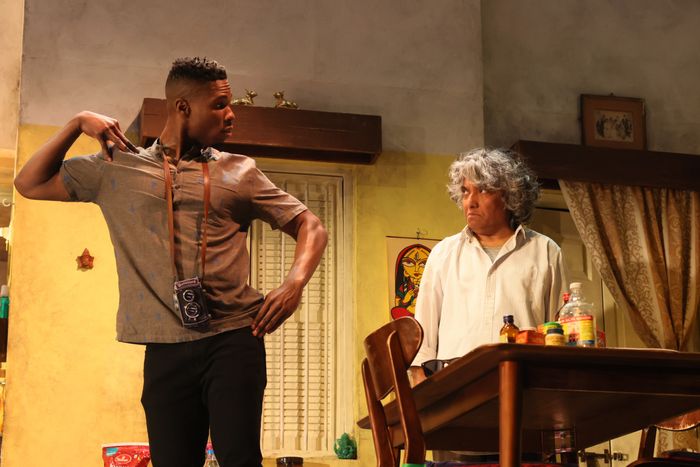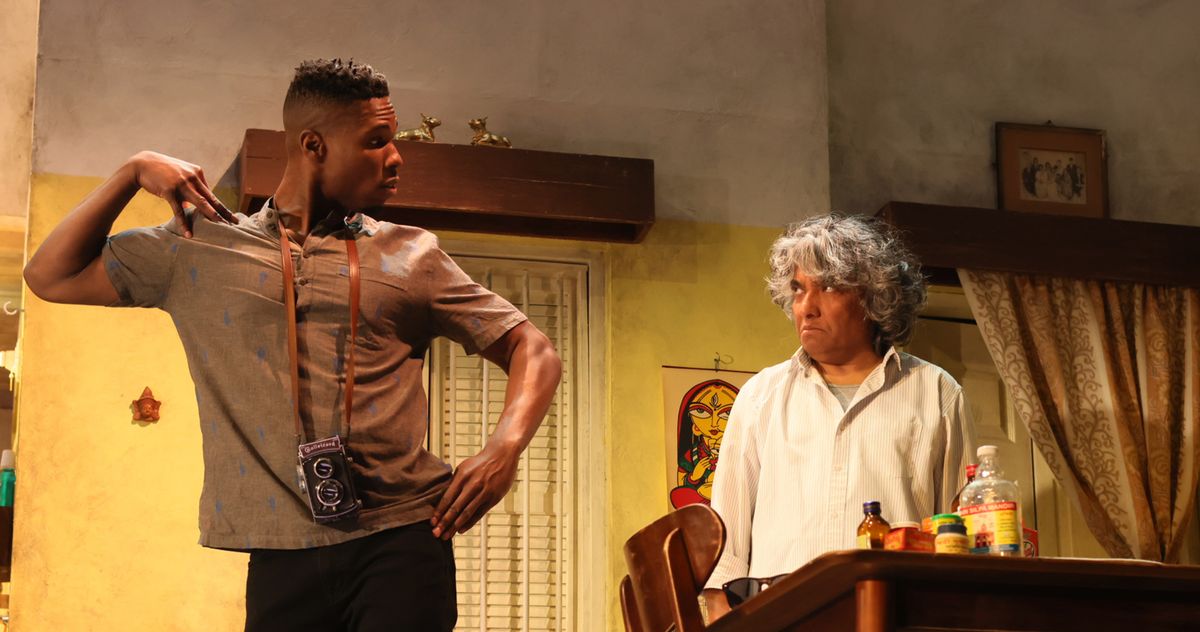
From Public Obscenities, at Theatre for a New Audience.
Photo: Hollis King
Plays tend to teach you how to watch them within the first five minutes. The good ones do it deliberately, the not-so-good ones less so. The fiction writer Rob Spillman calls it the “handshake.” A writer introduces themself — tells you, through the pressure and sensation of their grasp: This is the vocabulary; these are the rules.
Within the first few minutes of Shayok Misha Chowdhury’s exquisitely crafted Public Obscenities, two characters are chatting casually about directorial style. (Chowdhury also directs the production.) Raheem (Jakeem Dante Powell) is a Black American 20-something, a director of photography who’s visiting Kolkata for the first time with his Bengali boyfriend, Choton (Abrar Haque). While Choton — a high-strung grad student researching for a project on Indian “queer and trans vernaculars” — flashes between English and Bangla, snacking and translating and catching up with his aunt (Gargi Mukherjee), Raheem is having a slower, quieter, more piecemeal conversation with his boyfriend’s uncle (Debashis Roy Chowdhury). They’re discussing film directors from the Bengali neorealist movement, specifically Subrata Sen and Satyajit Ray.
“Sen is not so artistic I think,” says Pishe, Choton’s uncle, between bites of sweets. “Tai na? Not like Ray.” Raheem considers: “I guess I kind of feel like Sen’s films are more … painterly than … I mean, don’t get me wrong, Ray is a genius, obviously, I just … when I watch his stuff, I feel like … like he wants us to forget there’s a camera, right? … That kind of like … slice of life, super-naturalistic.” Pishe nods, munching. “See, for Ray, this is reality toh. He is showing the reality of the life in Bengal.”
Chowdhury, as both playwright and director, has introduced himself. In this meticulously rendered middle-class Bengali home, the characters of Public Obscenities won’t howl and grandstand. They won’t soliloquize or strut or be shattered by a devastating third-act reveal. They will simply live.
Except, of course, living’s not simple at all. Its texture is dense and detailed, rich and strange, even when the colors are muted, the tempo elongated in the summer heat, the volume turned down low. In the show’s program, Chowdhury discusses his fascination with writers whose work is often met with the facile assessment that “nothing happens”: Chekhov, Annie Baker, Richard Nelson, Amy Herzog, even Samuel Beckett. And although he adds that “it feels deeply humbling” to mention himself in their context, he has every right and reason to. With its layered story of bilingual identity, its concern with the infinitely varied truths of gender and sexuality that colonial law has tried to subjugate and regulate, and with the structures of class, culture, family, and desire that can be both comforting and oppressive, inborn and bizarre, leading to secrets, shames, covert expressions, unrealized lives — in its depiction of all of this, Public Obscenities could have become bombastic, ponderously self-important. It could have treated big things bigly, with, as Choton says derisively while discussing Bollywood movies, “longing glances and, like, dramatic eye makeup.” But the play’s great poignancy lies in its restraint, in the moments that could lead to shouting and instead lead to silence and space, the insufficiency — especially in a world of constant translation — of language.
As the outsider, and as the one holding a camera, always aware of how things are framed, Raheem is, for non-Bengali audience members, the conduit into Choton’s ancestral world. The play is fully bilingual (when the characters speak Bangla, there are elegant English supertitles), and Raheem does a lot of watching and listening. The whole ensemble is marvelous, with the feeling, in this second transfer of Soho Rep’s original production, of having settled into this intimate world together — and, as Raheem, Powell is particularly moving. He’s got the quiet attention and the quick politeness of a respectful guest (“Good boy!” says Choton’s aunt Pishimoni, pinching his cheek), but he’s also got the wider curiosity and deeper intensity of an artist and the playful, teasing affection of a sweet boyfriend.
“Or maybe don’t use your professional Grindr for drugs,” he ribs Choton, who’s on his phone recruiting subjects for his research project and maybe also trying to pick up some weed. The pair are lying in the dark on a makeshift living-room bed, underneath a mosquito net (a moment handled gorgeously by lighting designer Barbara Samuels, who leaves Raheem entirely in shadow, while Choton’s phone lights up only his own face). Chowdhury’s title refers to the litany of infamous “indecency” laws under the colonial-hand-me-down Indian Penal Code, which remains in effect to this day, but it’s also a comment on cultural divides: There is no privacy in the Bengali home. No screens on the windows, no doors to the rooms — only curtains and mosquito netting and open air. If everywhere is public, is all intimacy, all “nonnormative” behavior, suddenly obscene?
Questions like this one are part of what Choton is here to study, but Chowdhury is equally interested in the questions Choton doesn’t know to ask. One of the play’s most potent scenes occurs when Raheem and Choton are caught in an intimate moment by Jitesh (Golam Sarwar Harun, wonderfully subtle and expressive), who, for Choton’s family, has long been the household help. Raheem is embarrassed, yes, but he’s mostly upset for so embarrassing Jitesh. “I feel like we should apologize,” he stammers, but Choton — who, in countless other situations, is all jittery intellectual neuroses — pulls up his pants with authoritative exasperation. “I’ve told him a million times,” he snaps, “just, like … knock. You know?” Choton’s eyes are wide open to certain identities and injustices but blind to others. He can wax progressive on gender and sexuality while casually embodying the long legacy of caste. “I’m not tryna be initiated into the cult of Brahminical patriarchy,” he has previously quipped at his aunt, but there are certain initiations that take place invisibly, without ceremony.
As Raheem quietly reels, registering his lover’s disturbing cognitive dissonance, we can feel Chowdhury’s delicate, precise touch as both writer and director. This is exactly the kind of scene that, in another play, could lead to a shouty ideological cage match. Instead, Powell’s brow knits; his body tightens; we can sense the mingled contrition, shock, resentment, and sudden lostness coursing through him. “I need a minute,” he manages to get out. “I’m gonna go for a walk.”
It’s telling that, without Raheem, both Choton and the play lose their moorings as well — in a good way. After all, the DP has walked out. Where do we look now? How do we frame things? “I mean, if you want it to look natural, you’re gonna want consistent light,” Raheem has told Choton in an earlier scene as the pair are setting up to film, both suppressing his exasperation with Choton’s uninformed impatience and giving us, the audience, a hint as to the blurry ground between authenticity and artifice. Without Raheem, we lose perspective. Only a dose of ribald, good-natured caretaking from one of Choton’s interview subjects, a kothi trans woman named Shou (the delightful Tashnuva Anan), keeps him from floundering. Chowdhury’s not giving us a lecture on the courage and solidarity of India’s diverse gender-nonconforming community. He’s just letting his characters be. “Listen, I don’t know much about all this ‘queer’ business,” says Sebanti (NaFis), an older friend of Shou’s who identifies as hijra and blows through the play in a glorious burst of self-possession. “I’m a simple person. Here’s my blessing.”
Of course that simplicity is all more complicated, more difficult, weirder, and wilder than we can guess. Raheem spends most of the play with an old Rolleicord camera around his neck. It belonged to Choton’s grandfather, Pishimoni’s father, whom she still reveres. A severe, bespectacled portrait of him hangs above a household shrine, his stern gaze giving Choton the willies. But when Raheem discovers an old roll of film in the camera and has it developed, the picture of who exactly Choton’s grandfather was starts to shift — its focus softening, its familiar lines curling slyly. Chowdhury could push this device toward melodramatic revelation. Again, he holds back. Some things refuse to be translated.
Public Obscenities is at Theatre for a New Audience through February 18.
